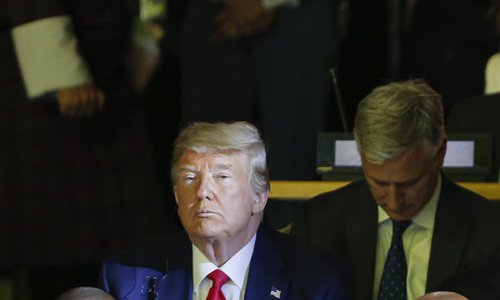Politics determines Trump’s stance on climate change

US President Donald Trump attends the UN climate summit in New York on September 23, 2019 Photo: VCG
US President Donald Trump on Monday made a 15-minute brief stop at the UN climate summit, which drew about 60 world leaders, before he moved to a smaller event and delivered remarks on religious freedom.
Trump has been saying that climate change is a hoax. Therefore, the key aim of Trump to participate in the UN Assembly was not to discuss about climate. By attending a US event, which aimed at slamming China over the country's Xinjiang Uyghur Autonomous Region on the sidelines of the annual gathering of world leaders at the UN, Trump in fact intended to divert attention of the international community. This showed his condescending attitude toward the UN.
The international community has great expectations of the US assuming bigger responsibilities on climate change issues, which we can see in the process of global climate negotiations. The international community hopes the US will reduce carbon emissions and wishes the US could provide more financial and technology support in dealing with climate change. However, actual moves by the US are contrary to such expectations.
The Trump administration has been extremely irresponsible in handling climate change. US greenhouse gas emissions rose by 3.4 percent in 2018, reversing a three-year decline. It is worth pointing out that Trump's negative approach to climate change has been criticized even within the US. Many states in the US have taken local measures to deal with climate change after the federal government failed to do so.
Upholding "America First" policy means that if dealing with climate change hinders US economic growth, affects employment, or undermines US international influence and hegemony, the Trump administration will not care.
The Trump administration regards climate change as a political issue rather than a global public hazard. It involves itself in any issue that can improve its political status or help Trump gain more votes; otherwise, it doesn't care - this is a very unhealthy policy adopted by short-sighted politicians.
As the US presidential election draws near and Trump's focus shifts to getting reelected, one reason Trump balks at climate change issues is his vote bank. Trump to some extent represents his voters, who believe climate change is pseudoscience and a trap laid by others to hinder US development.
Another reason is a political split in the US - Republicans deny climate change while Democrats don't. US politics determines that no parties are rational. If one party supports something, the other one will oppose it. Climate change is a good example.
Trump plans to expand offshore oil and gas drilling in the Arctic Ocean and parts of the North Atlantic, and turn the US into world's top oil exporter. However, dealing with climate change demands restrained use of fossil fuel, or fuels that generate greenhouse gases. Trump's plans are undoubtedly undermining global efforts to deal with climate change.
But Trump's plans for oil drilling could help mitigate unemployment pressure in the states that are rich in oil and gas resources. When there is contradiction between Americans' livelihoods - which can be translated as "votes in favor" - and global welfare, Trump doesn't hesitate to choose the former.
All in all, one thing is pretty clear: Domestic political disputes in the US have become an important reason why the US federal government is unwilling to be active in dealing with climate change. The disputes have limited US contribution to the international society's efforts.
The article was compiled by Global Times reporter Xu Hailin based on an interview with Li Haidong, a professor with the Institute of International Relations at China Foreign Affairs University. opinion@globaltimes.com.cn